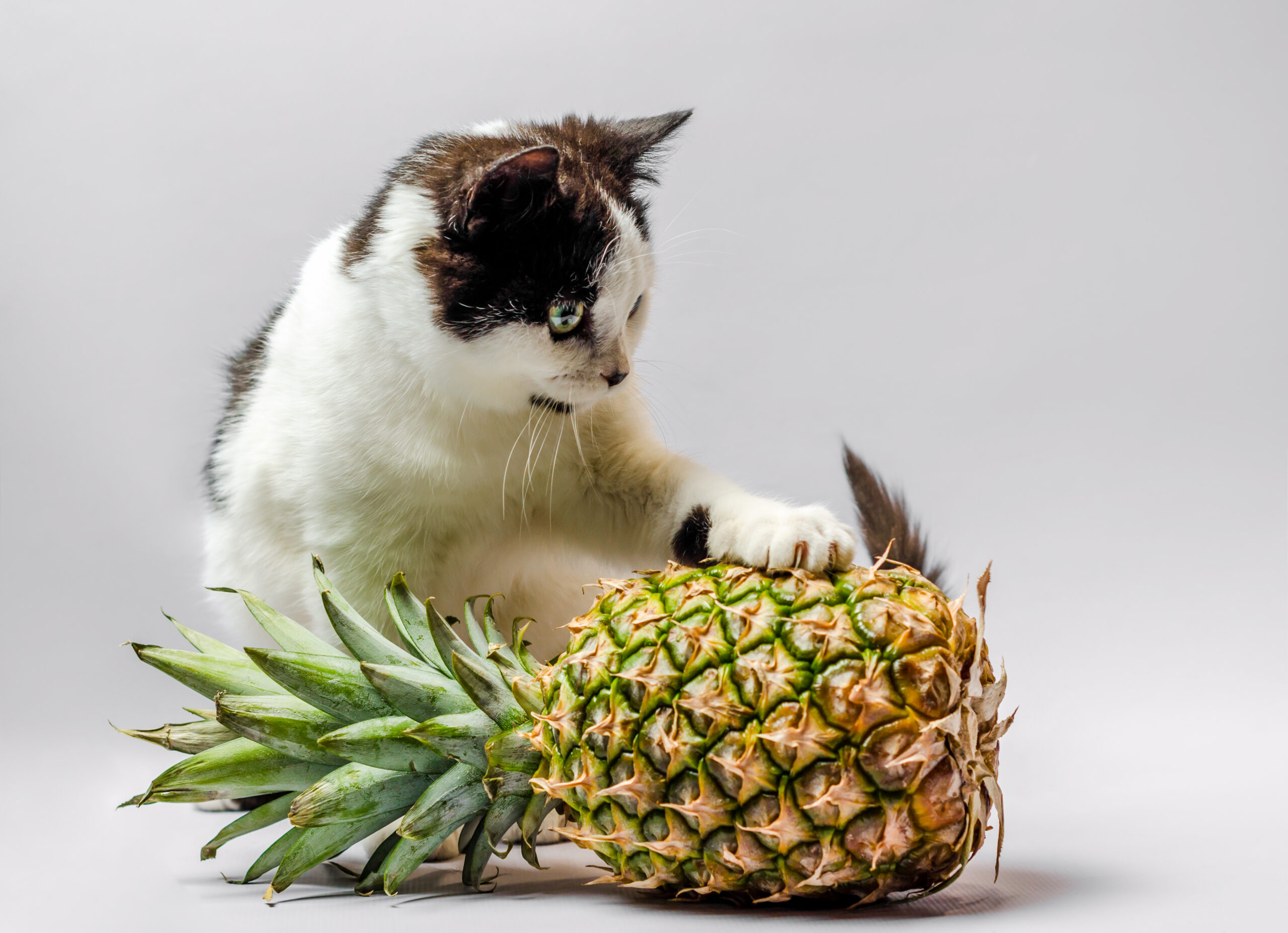
As a pet owner you probably ask yourself whether cats can safely eat pineapple since this tropical fruit brings refreshing enjoyment to humans. This guide provides all the information you need about feline-safe foods including pineapple. This article explains whether pineapple is suitable for your pet along with its nutritional value and safety guidelines for introduction.
This post will provide you with all the information you need about pineapple as a dietary component for cats and its position as a potential treat option.
Is Pineapple Safe for Cats?
Cats can safely consume pineapple as an occasional treat yet several essential points need consideration when feeding this fruit to them. Pineapple does not cause harm to cats because of its high sugar content and acidity but becomes problematic when given in large amounts.
Small portions of pineapple can serve as occasional treats for obligate carnivorous cats who need meat as their main food source. Cats should consume pineapple only after you remove the tough outer skin and core because these components are challenging to digest and might cause choking.
Important Q&A on Pineapple for Cats
Q: Is pineapple toxic to cats?
The correct preparation of pineapple makes it safe for cats to consume.
Q: Can kittens eat pineapple?
The developing digestive system of kittens makes pineapple consumption unsafe because they lack the ability to process sugar and acidity properly. Your kitten should eat only food and treats designed for their age group.
Q: Why Cats benefit most from fresh pineapple rather than canned pineapple.
A: Fresh pineapple is preferred. The syrup used to preserve canned pineapple contains dangerous additives and preservatives which can harm cats.
Nutritional Breakdown of Pineapple for Cats
Pineapple delivers a strong nutritional impact to its consumers. The nutritional content of this fruit along with its health effects on cats will be discussed in the following summary.
| Nutrient | Benefit for Cats | Potential Risks |
| Vitamin C | Boosts the immune system (though cats produce their own) | Excessive amounts can cause digestive upset. |
| Fiber | Aids in digestion in small amounts | Too much can lead to diarrhea. |
| Manganese | Supports strong bones and antioxidant enzymes | Rarely an issue unless consumed in excess. |
| Sugar | Provides energy | High sugar levels can lead to obesity or diabetes over time. |
While pineapple has some nutritional benefits, the high sugar content makes it unsuitable as a regular snack for your cat.
How to Safely Feed Pineapple to Your Cat
To feed pineapple to your cat safely you should follow these basic guidelines which will protect your pet and yourself from stress.
- Fresh ripe pineapple should always be your preferred choice when feeding your cat pineapple. Canned pineapple along with pineapple juice should be avoided because they contain excessive sugar and additional processing ingredients.
- The spiky outer skin along with the hard core should be discarded because these parts are difficult to digest and create choking risks for your cat.
- Rinse under running water to eliminate pesticides and harmful residue from the pineapple before giving it to your cat.
- Cut pineapple into small pieces because your cat has a tiny mouth that needs easily chewable and swallowable portions.
- Offer your cat only one tiny piece of pineapple as their first introduction to this food. After watching your cat’s reaction to the pineapple treat you should provide it sparingly because it should never substitute regular meals.
A Word of Caution
Check for food allergies or digestive distress in your cat after introducing pineapple since you need to observe their reactions. The warning signs of pineapple consumption problems in cats include vomiting and diarrhea and lethargy and strange behaviors. Contact your veterinarian immediately if you detect any of these symptoms while your cat consumes pineapple.
Which Fruits Are Acceptable For Cats To Consume?
Your cat can enjoy a variety of other safe fruits as long as pineapple does not appeal to them. The following list contains safe fruits for cats to eat:
- Blueberries – Packed with antioxidants.
- Apples (seedless) – A good source of fiber and vitamins.
- Watermelon without seeds provides hydration along with refreshing effects.
- Strawberries – A tasty source of antioxidants and vitamin C.
- Bananas – Rich in potassium.
Before giving fruits to your cat you must always remove seeds and skins and pits from the food.
Fun Fact About Cats and Sugar
Cats have no ability to detect sweet tastes in their food. Through their natural development as meat-eating animals cats never developed the taste receptors which humans possess for sweet flavors. Your cat will probably investigate the pineapple with curiosity yet it will prefer your roast chicken as its main attraction.
Is pineapple an appropriate food for cats to consume?
The short answer? Your cat should not consume pineapple as a regular dietary component. They need their main nutrition to come from a balanced diet which contains proteins and essential fatty acids and feline-specific nutrients.
Your feline should consume pineapple treats only to the extent of 10% of their daily calorie allowance.
Final Thoughts on Pineapple for Cats
Trying new treats with your cat can create a positive enrichment experience while your main responsibility should be their health and security. Cats can receive pineapple as a small portion of their diet when it is fresh and properly cut into pieces. Your cat’s carnivorous diet requires high-quality animal protein to make up most of their food intake.
All new foods that you want to add to your cat’s meal plan should be reviewed by a veterinarian before your attempt.
Do you wish to find secure domestic fruits that your cat can consume? The best resources for maintaining your cat’s happiness and wellness are available through comments or trusted online information platforms.
Leave a Reply